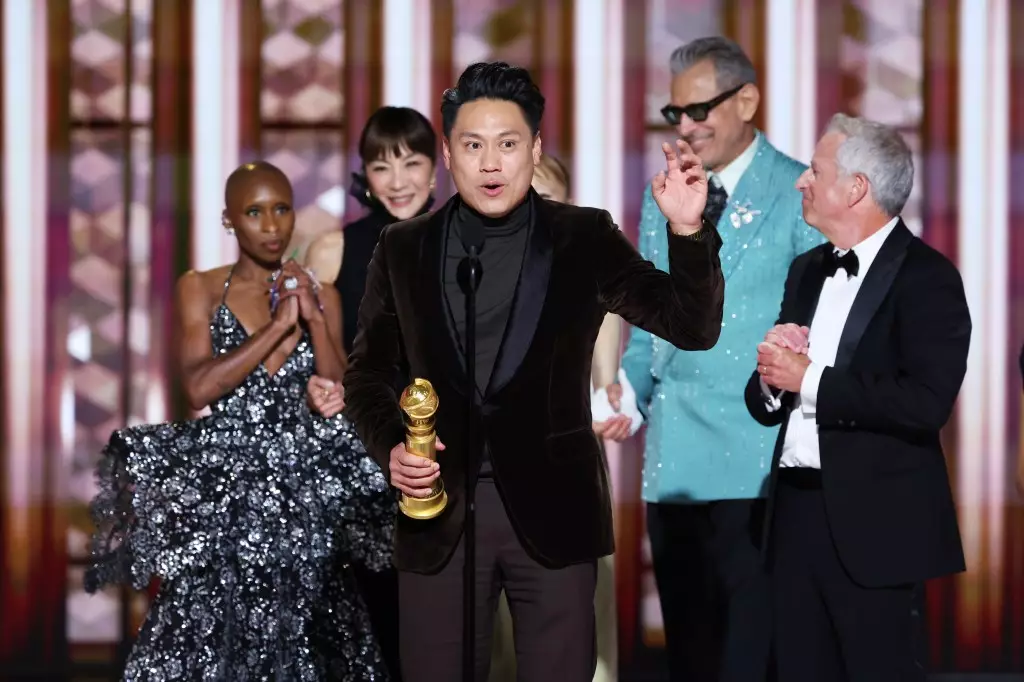The cinematic world continues to evolve with bold narratives, rich visuals, and profound messages, as highlighted by Jon M. Chu’s recent acceptance of the Golden Globe for Cinematic and Box Office Achievement for the film adaptation of “Wicked.” In a stirring address, Chu not only expressed gratitude but also emphasized the vital role that art and storytelling play in contemporary society. This year’s award signifies more than just box office success; it reflects a collective yearning for positivity in a world often overshadowed by skepticism and despair.
The Golden Globe for Cinematic and Box Office Achievement is a relatively new accolade designed to recognize films that resonate deeply with audiences worldwide, becoming cultural touchstones. With “Wicked” taking home the prize, this reinforces the idea that box office dollars often translate into communal experiences. Last year, Greta Gerwig’s “Barbie” took the inaugural award, setting a precedent that celebrates cultural phenomena rather than merely capitalistic success.
“Wicked,” which released in November, has already made significant strides, surpassing previous records for stage musical adaptations. Its worldwide gross of $681.3 million not only marks a financial milestone but also indicates the film’s ability to strike a chord with a diverse audience. By emphasizing art as a means of building and nurturing community, “Wicked” transcends conventional definitions of success.
Jon M. Chu’s acceptance speech radiated with emotion as he recounted his family’s journey to America and their love for “The Wizard of Oz.” His reflections reveal a profound connection between personal experiences and the tales we tell. The imagery of the Yellow Brick Road serves as a metaphor for aspirations and dreams, encouraging audiences to believe in their potential. Chu’s statement illustrates that cinema is not merely entertainment; it is a shared human experience that can inspire hope amidst adversity.
The film “Wicked” explores the origins of the renowned witches of Oz—Elphaba, played by Cynthia Erivo, and Glinda, portrayed by Ariana Grande. Their unlikely friendship, developed during their time at Shiz University, embodies the complexity of human relationships. Through their journey, viewers are invited to confront themes of acceptance, self-discovery, and empowerment. Chu’s heartfelt homage to the cast and crew further underscores the collective effort that goes into creating meaningful art.
In his speech, Chu poignantly articulated how art functions as a “radical act of optimism” in our current age. In an era marked by division and despair, “Wicked” serves as a beacon of hope. It encourages audiences to not only dream but also to confront their fears and challenges with bravery. The film’s success is a testament to the need for narratives that empower individuals to embrace their unique identities and strive for change.
This messaging resonates not only with fans but also with creatives who pour their hearts into their projects. By acknowledging the contributions of various artisans—craftspeople, dancers, and artists—Chu highlights the extensive collaboration that characterizes filmmaking. The film becomes a reflection of collective dreams, where each individual’s passion contributes to a richer tapestry of storytelling.
“Wicked” draws from Gregory Maguire’s novel, delving into the lives of two distinctly different women who face significant challenges in their lives. Elphaba’s journey from being an outcast due to her green skin to discovering her power parallels Glinda’s transformation from privilege to understanding the essence of true friendship. The film’s narrative promotes the idea that adversity often leads to profound personal growth and resilience.
This resonates with viewers who may see parts of themselves in the characters’ struggles. Through narratives like those presented in “Wicked,” audiences are reminded that they, too, possess the strength to confront societal norms and embrace their individuality. The film’s upcoming sequel promises to continue exploring these vital themes, further engaging audiences and deepening the conversation around empowerment and self-discovery.
The accolades received by “Wicked”—including Best Motion Picture nominations and individual performances for Erivo and Grande—serve to highlight its cultural significance. Beyond the awards, the film has gained recognition for its ability to resonate with audiences and create a communal experience in theaters. As audiences sing along, share their enthusiasm through social media, and partake in themed merchandise, the film transforms into more than a movie; it becomes a movement.
The triumph of “Wicked” at the Golden Globes exemplifies the importance of art in a time when positivity is often overshadowed. Jon M. Chu’s reflections remind us that storytelling—and the connections it ignites—can empower us to navigate an unpredictable world. As “Wicked” continues to write its legacy within the cinematic landscape, it promises to illuminate paths for both creators and audiences alike.

